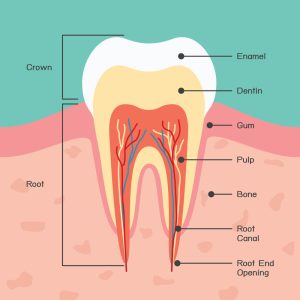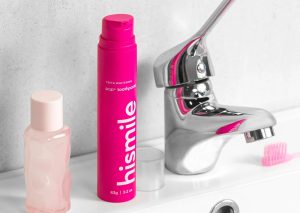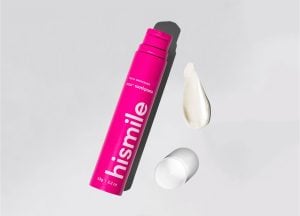The PAP+ Whitening Toothpaste from Hismile:
• Is fluoride-free
• Remineralizes enamel
•.Creates a protective layer throughout the day
• Fights cavities and tastes good with Xylitol
• Relieves and protects against sensitivity
Click the button below to see the best price for the Hismile PAP+ Whitening Toothpaste.
Tooth demineralization
First, let’s talk a little bit about the tooth demineralization process and what that really means — bear with us because we have to briefly dive into the world of science.
Tooth enamel comprises mainly noncollagenous protein, whose main component is biological apatite — forming the hardest tissue in the body, even harder than bone and the dentin beneath your enamel.


Demineralization is a process wherein mineral ions are removed from the hydroxyapatite crystals in your enamel. When this happens, teeth experience a greater level of sensitivity to hot, cold, and pressure.
Additionally, without a strong structure of hydroxyapatite, the risk for cavities increases.
Demineralization is typically caused by acid from food and drink, and from the bacteria that are present in your mouth.
The good news is that demineralization is reversible — the hydroxyapatite crystals in your enamel can grow again to their original size if they are given the right oral environment for remineralization to happen — and that’s where hydroxyapatite toothpaste comes in.
If you’re dying to read more about the processes that go on in your tooth’s enamel on a molecular basis, you can check out this article from the International Journal of Nanomedicine.
What is hydroxyapatite toothpaste?
Hydroxyapatite, (HAp) is the primary component of tooth enamel and contains important minerals. Enamel is the outer layer of teeth and protects your teeth from harmful bacteria and decay.


Toothpaste that contains hydroxyapatite can help strengthen your enamel and remineralize teeth, because the hydroxyapatite bonds with the enamel and fills the little tubules that go through your teeth, leading to the dentine. When enamel erodes, these tubules are exposed, and this leads to sensitivity.
Fluoride is the typical ingredient in toothpaste for anti-cavity protection, but hydroxyapatite is becoming a more popular toothpaste alternative, as HAp toothpaste has been found to increase the dentin hardness of a tooth more than fluoroapatite, which forms when fluoride remineralizes a tooth.
However, just because you are interested in using a toothpaste with HAp, doesn’t mean you have to give up fluoride — these two ingredients are safe to use together, with fluoride’s primary role to get rid of bacteria, and hydroxyapatite stopping the bacteria from sticking to your teeth, while helping with the remineralization process.


What are the benefits of hydroxyapatite toothpaste?
There are various benefits of using a toothpaste with hydroxyapatite, namely remineralization of enamel, cavity protection, and sensitivity relief — let’s go over them now.
Remineralization
One of the primary benefits of HAp toothpaste is that it contains ingredients that help remineralize tooth enamel, meaning it is a great alternative for people with concerns about fluorosis.
To be clear, once enamel has been eroded, it won’t grow back. But, with HAp you can put lost minerals back into the enamel you still have left — this is the process of remineralization.
When you remineralize your teeth, you help protect them against sensitivity and decay.


Antibacterial
You probably know by now that oral bacteria is what leads to tooth decay. Acid that comes from the food and drink we eat causes the enamel on our teeth to break down. When we leave this acidity in our mouths it creates an environment in which certain bacteria will thrive, which will cause the enamel to dissolve further.
HAp toothpaste increases the source of calcium in the saliva, which benefits the tooth in highly acidic diets. Toothpaste with HAp, such as Hismile PAP+whitening toothpaste, also forms a protective layer around your teeth that protects against bacteria and enamel-eating acid.
Sensitivity relief
HAp toothpaste will coat your teeth and fill in your teeth’s tubules — little passageways that lead from the outside of your tooth to the dentin below — and this can help decrease sensitivity and protect against future sensitivity.
Side effects of toothpaste with hydroxyapatite
Some people may experience an allergic reaction to hydroxyapatite, but it’s highly unlikely. In this study from Scientific Reports, it was found that HAp does not alter the normal processes of cells and is safe to use in oral care products.
Our top pick
Fluoride is still the most common ingredient in toothpaste when it comes to fighting cavities, but HAp is slowly making its way into more products. When it comes to our top picks for toothpaste with hydroxyapatite, HiSmile takes the win.
Hismile PAP+ whitening toothpaste provides effective daily whitening with a fluoride-free formula. The main ingredients in the whitening gel are Phthalimidoperoxycaproic Acid (PAP), Potassium Citrate, and Hydroxyapatite.
All of these ingredients are safe to use and in fact, improve the health of your smile while whitening your teeth.
Hismile PAP+ toothpaste works by oxidizing stains on the tooth without releasing harmful molecules known as free radicals. This means that no damage or erosion to the enamel will occur and the outer layers of the tooth remain intact, whilst being effectively whitened.
Conclusion


Hydroxyapatite toothpaste can help remineralize teeth and strengthen enamel. The main effects of remineralization are less sensitivity and greater resistance to cavities and decay.
Studies are showing that HAp can be highly effective, and has no known side effects — unless someone is allergic to HAp, which seems to be rare.
Alongside their PAP+ whitening toothpaste, Hismile has a full range of PAP+ whitening products, including whitening strips, powder, and more! You can also get the Hismile V34 Color Corrector serum for instantly whiter teeth.
But remember, whatever toothpaste you use, the most important thing is to brush twice a day using the proper technique, floss at least once per day, and visit your dentist regularly!
FAQs
What is hydroxyapatite toothpaste?
Hydroxyapatite toothpaste is a toothpaste that redeposits lost minerals into your tooth enamel, providing a protective coating that relieves sensitivity while remineralizing enamel.
Is hydroxyapatite in toothpaste safe?
Hydroxyapatite has been shown in studies to be safe for use in oral products, without any known side effects. It’s being used more and more in whitening products and cleaning products for this reason.
Can hydroxyapatite reverse cavities?
Hydroxyapatite can help remineralize enamel. If the process of decay has only just begun, it’s possible that with continued use, your enamel can be restored and the decay process reversed.
PubMed: Demineralization-remineralization dynamics in teeth and bone. Consulted 29th September 2022.
Scientific Reports: Nano-hydroxyapatite in oral care cosmetics: characterization and cytotoxicity assessment. Consulted 29th September 2022.





